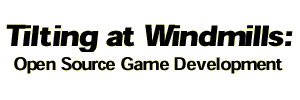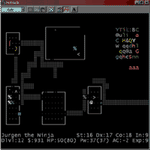 Open source says phooey to Mr. Bill by Greg Costikyan
If you're at all interested in software development, you're probably aware of the open-source software (OSS) movement. But in case you aren't, I'll recap. Open-source software is free. It's not only free to download and use, the source code is freely available. That means you can extend it and fix, use, and modify it however you want. That's extremely powerful for anyone running, say, an internet site; if you use the Apache server, one of OSS's success stories, you aren't reliant on bug fixes from Microsoft or some idiot on the other end of a support line to help you. You've got the code, and you've got access, via email and listservs, to thousands of other Apache sysadmins and hackers to help you with problems. So much for the advantage to users; OSS has one other big, big advantage: bugs are trivial. In traditional, proprietary software, the only people who ever get to look at the code are a few engineers at the software company. In other words, maybe a couple dozen eyes scan the code; and a couple dozen eyes are invariably going to miss bugs. With the best will in the world, proprietary software is buggy software. In the OSS world, thousands of eyes look at the code. And when an experienced user finds a problem, he can do something about it, instantly, because he has the source code. If he has the skills, he can fix the problem himself--and email the bug fix to the people who manage this OSS project. They'll review it, and if it makes sense, it will get incorporated immediately in the next release of the software. Even if you can't fix the problem yourself, you can alert the OSS team to the problem--and they'll put it on the list of known bugs, and some hacker will notice it and decide it needs a solution.
OSS teams typically do dozens of new software releases every year. The software improves continuously and incrementally. The result: Linux is the single most stable operating system in the world. Apache servers have run literally for years at a time without a crash. But...how does anyone make money doing this? And why would anyone work on an OSS project? People work on OSS projects for the egoboo. You make a name for yourself if you contribute meaningfully. You obtain the respect of your peers. And "the respect of your peers" can translate into consulting work, book contracts, tenure, investment capital.... You may not become rich like Netscape cofounder Marc Andreessen, but you can live a perfectly good life, like Tim Berners-Lee, director of the World Wide Web Consortium. Eric Raymond, for instance, is pursued by people offering consulting gigs, solicited by venture capitalists, and is a resource for journalists, all because he's responsible for fetchmail, one of the key bits of software that gets your email delivered. (Well, that plus he's a relentless self-promoter.) It's a potluck economy; give, and you shall receive. As such, it is subversive of the whole established process of commercial software development. And as a software development model, it's winning. Apache is gaining market share at the expense of Microsoft's and Netscape's internet servers. Linux is destroying the market for proprietary versions of Unix. The GUI interfaces for Linux are still not ready for prime time--but this is the last, best hope for attacking the Microsoft monopoly in operating systems.
Can it work for games? In a sense, it already has. I don't know about you, but when I'm tired and want to play a game for a bit and don't want the intensity and emotionally draining experience I get from Quake or the degree of thought required for Civilization II, I fire up NetHack. NetHack?! Who could be interested in an ASCII graphics game in this era of real-time 3D? NetHack has more depth of gameplay, more clever little ways to beat the system, more variety, and more humor than 99+ percent of the games published today. Sure it's stuck in the world of ASCII, but the game's the thing, not the media glitz, right? Hell, I play a lot of Cheapass boardgames, printed in black and white on paper. I play a lot of paper RPGs, scribbling on notepaper with pencils. Sure I admire nicely rendered graphics and a hot 3D engine, but I don't play games because I like pretty visuals or cool sounds; if that's all I want, I'll go to the movies or, for that matter, the Metropolitan Museum of Art. Give me a game--and that's what NetHack gives me. Next page: so does NetHack have a place in the modern world?
|
